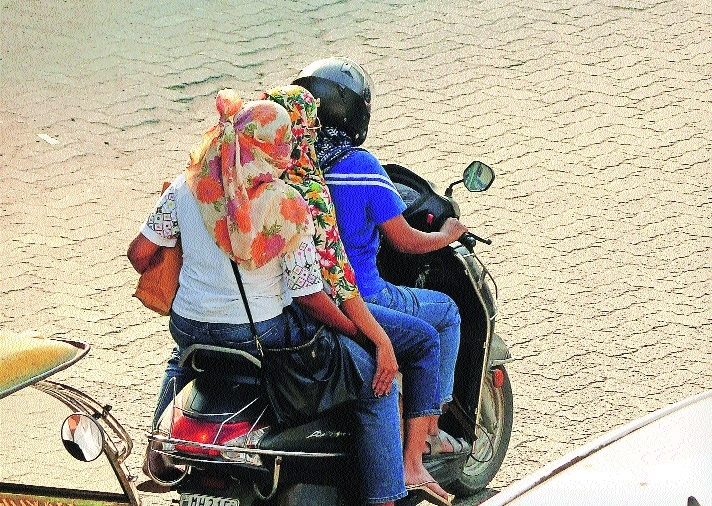Double Helmet Rule Nagpur City and Rural Police fail to enforce
16 Nov 2024 11:31:43

By Shirish Borkar :
Road safety experts warn that pillion riders are particularly prone to fatal head injuries due to the lack of protection as they are typically not in control of the vehicle and are less likely to anticipate a crash.
NCONSISTENT enforcement of the double helmet rule has brought the Nagpur City and Rural Police under scrutiny. The double helmet rule
mandates both the rider as well as the pillion passenger to wear helmets while riding a two-wheeler. However, enforcement in Nagpur
district remains lax and
many pillion riders go unpunished even though they are most vulnerable to injury or death than the rider in most accidents.
Despite strict regulations that require protective
headgear for both parties, many pillion riders continue to travel without helmets, putting them at heightened risk of severe injuries
or death in the event of
an accident.
In February this year, Justice Abhay Manohar Sapre, Chairman of Supreme Court Road Safety Committee, in a joint
meeting held in Nagpur had directed Commissioner of Police, Transport Commissioner, District Collector, Superintendent of Police (Nagpur Rural), Highway Police, officials of National Highway Authority of India and Public Works Department said that the
helmet laws be made
applicable both for riders
and pillion riders.
While the police have been actively cracking down on riders who fail to wear
helmets, pillion passengers, who are equally vulnerable
in accidents, often escape scrutiny.
Road safety experts warn that pillion riders are
particularly prone to fatal head injuries due to the lack of protection as they are
typically not in control of the vehicle and are less likely to anticipate a crash.
The Motor Vehicle Act clearly stipulates that
both the rider and pillion passenger should wear
helmets that conform to
safety standards set by the Central Government. Helmets must be thick
(22-25 mm), weigh around 1.2 kilogramme, and feature high-quality foam.
Moreover, all helmets sold in India must have the ISI mark, ensuring they meet these safety requirements.
However, lack of consistent enforcement of the law,
especially with regard to
pillion passengers, continues to contribute to preventable fatalities.
In cities like Mumbai, the double helmet rule has
been firmly established. A helmetless pillion rider can face a fine of Rs 1,000.
In Pune, a new regulation has made it mandatory for all employees of government, semi-government agencies, municipal corporations, municipal councils, and
government colleges to
wear helmets while riding
two-wheelers. Even the employees riding pillion
have to wear protective
headgear. To ensure
compliance, punitive
measures are being
introduced, with violations being recorded in the
service books.
The law is clear Anyone over the age of 4 years riding pillion on a motorcycle or scooter must wear a helmet.
However, experts argue that stronger policing is needed to protect pillion
riders, whose lives are at
risk due to the widespread non-compliance with the helmet rule.
Road safety advocates are calling for robust law enforcement and greater awareness campaigns to ensure the safety of all riders and passengers. As road fatalities continue to rise, the failure to implement the double
helmet rule uniformly is becoming a critical concern for public health and
safety officials.
Figures on road fatalities between January and October 2024 showed 80 per cent of road accident deaths were due to head injuries. Despite these efforts, a major portion of the city’s population
continues to disregard
helmet use.
According to senior police officials, roughly 25 per cent of Nagpur’s drivers still fail
to wear helmets regularly, often only doing so when they spot traffic police or CCTV cameras.
When contacted, a
senior police official on the condition of anonymity said, “We do take action against pillion riders for not wearing helmets but our priority focus is on two-wheeler
riders without protective headgear. The law mandates compulsory wearing of
helmets for two-wheeler
riders and pillion riders
and offenders were being ‘challaned’ and their driving licenses were suspended for a period of three months as well,” he claimed.